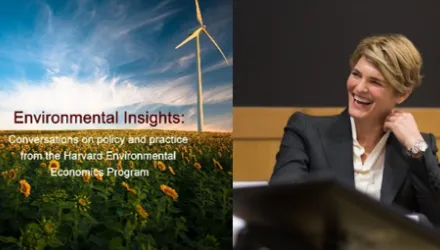Panel at Harvard Alumni Association annual Global Series conference in Shanghai, China
Harvard Kennedy School (HKS) Dean David Ellwood and HKS faculty John P. Holdren and Kelly Gallagher joined with Dr. WANG Yuan, President of the China Academy of Science and Technology for Development, and Professor ZOU Ji, Vice Dean, School of Environment and Natural Resources, Renmin University for a panel discussion on "The Challenge of Energy and Environment in China" at the Harvard Alumni Association annual Global Series conference in Shanghai on March 28-30, 2008.
The 2008 HAA Global Series brings alumni together to participate in academic symposia and learn about important initiatives shaping Harvard's future.
Here is an overview of the issues from Holdren's talk. The complete presentations from the panel discussion can be downloaded below.
Why is energy important?
Because...
- Meeting basic human needs is important
- Economic growth is important
- The environment is important
- International relations are important
- Energy is intimately entwined with all four
Economically...
- Affordable energy is a crucial ingredient of sustained prosperity & sustainable development.
- Energy is ~10% of GDP, 10% of world trade, and a large part of trade deficits in importing countries
- Costly energy → inflation, recession, frustration of economic aspirations of the poor.
- Investments in energy-supply systems are ~$800 billion/yr worldwide; ~15% of gross domestic investment in developing countries.
Environmentally...
- Energy supply = major contributor to dangerous & difficult environmental problems from local to global
- Specifically, energy supply is the source of:
- most indoor and outdoor air pollution, most acid rain
- much of the hydrocarbon and trace-metal pollution of soil and ground water
- almost all of the oil humans add to the ocean
- most radioactive waste
- most of the human emissions of greenhouse gases that are disrupting global climate.
International Relations...
- Oil & gas are so important to economies that suppliers can use cut-offs as a weapon, and importers may threaten or wage war to gain or maintain access.
- Spread of nuclear-energy technologies spreads access to nuclear-weapon capabilities
- Energy systems are "force-multiplier" targets for terrorists: dams, nuclear reactors, oil refineries...
- Internal & international tensions & upheavals can result from energy-strategy inadequacies that threaten, create, or perpetuate great economic or environmental harm.
High fossil fuel dependence already causes big problems for Asia and the world
- Increasing dependence on imported oil & natural gas means economic vulnerability, as well as international tensions and potential for conflict over access & terms.
- Coal burning for electricity and industry and oil burning in vehicles are main sources of severe urban and regional air pollution - SOx, NOx, hydrocarbons, soot - with big impacts on public health, acid precipitation.
- Emissions of CO2 from ALL fossil-fuel burning are largest driver of global climate disruption, already associated with increasing harm to human well-being and rapidly becoming more severe.
- The oil market, pollutant transport, & climate are global. Each country is affected by what other countries do.
Solutions: Better technologies are key
- Only with improved technologies can we:
- Limit oil imports & oil dependence overall without incurring excessive economic or environmental costs
- Improve urban air quality while meeting growing demand for automobiles
- Use the world's abundant coal resources without intolerable impacts on regional air quality, acid rain, and global climate
- Expand the use of nuclear energy enough to make a difference for climate change and oil & gas dependence, while still reducing accident/terrorism & proliferation risks
Needed: New or improved technologies
- Cleaner, more fuel-efficient motor vehicles: hybrids (diesels, plug-in hybrids)
- More energy-efficient commercial & residential buildings
- Fuel- and electricity-efficient manufacturing
- Improved coal technologies to make electricity & hydrogen with CO2 capture & storage
- Advanced nuclear reactors with increased safety and proliferation-resistant fuel cycles
- Biofuels that don't compete with food & forests
- Cheaper photovoltaic cells
Policy innovation is needed to:
- Provide the scale, continuity, & coordination of effort in energy research & development needed to realize in a timely way the required technological innovations
- Get the benefits of market competition in the electricity sector while protecting public goods (provision of basic energy services to the poor, preservation of adequate system reliability, protection of environment)
- Ensure the rapid diffusion of cleaner and more efficient energy technologies across the least developed countries and sectors
- Devise and implement an equitable, adequate, and achievable cooperative framework for limiting global emissions of greenhouse gases
Asia's role in solutions:
- Good education system, high production of scientists & engineers, & business environment favor rapid innovation.
- Asia's growing role in global energy-environment problems means USA & Europe want to cooperate with Asia to solve these problems (e.g., cost-sharing, technology transfer).
- High growth rate of Asian economies allows for dominance of new, efficient technologies & infrastructure over old, inefficient ones.
- This and other factors position Asia to be a world leader in renewable energy, energy efficiency, clean coal.
- Underdeveloped rural regions in Asia provide opportunity to plan & build new resource-conserving towns.
Full presentations from the panel discussion:







